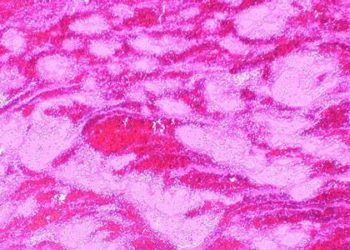Factor XI anti-sense oligonucleotide bests enoxaprin for venous thromboembolism in knee surgery
1. A factor XI anti-sense oligonucleotide, FXI-ASO, was associated with lower incidence of venous thromboembolism compared with enoxaparin in patients undergoing elective total knee arthroplasty.
2. There were no difference in major or clinically-relevant non-major bleeding when comparing FXI-ASO and enoxaparin.
Evidence Rating Level: 2 (Good)
Study Rundown: Venous thromboembolism (VTE) or venous clot with risk of embolism to the lungs, is a common complication in postoperative patients who have classic risk factors of endothelial injury, venous stasis and hypercoagulability (Vichow’s triad). Previous studies have demonstrated that patients with a congenital absence of factor XI – part of the intrinsic pathway of the coagulation cascade – have a reduced risk of venous thromboembolism, thus making it an attractive target to block. In an attempt to reduce VTEs in surgical patients, FXI-ASO was developed as a novel agent (anti-sense oligonucleotide) aimed at inhibiting factor XI messenger RNA.
This open-label study enrolled patients undergoing elective single total knee arthroplasty. Patients were randomized to either one of two doses of FXI-ASO or enoxaparin. The primary endpoint of incidence of VTE was observed in 27% (FXI-ASO 200mg), 3% (FXI-ASO 300mg) and 21% (enoxaparin) (P=0.59 and P<0.001 for superiority to enoxaparin, respectively). Safety outcomes of clinically-relevant or major bleeding were similar among the three groups studied.
The premise of FXI-ASO is not consistent with the belief that tissue factor (part of the extrinsic pathway) is the main culprit in postoperative VTEs. This study is mostly limited by the open-label design, and the generalizabiity of the results is limited by the fact that it was carried out in such a specific surgical population.
FXI-ASO is a promising step forward for a potential future in targeted therapies which aim to regulate cellular function at the level of translation. Further studies will focus on the long-term safety and feasibility of providing these types of therapies as well as whether FXI-ASO confers similar VTE-prevention benefits to other surgical populations.
Click to read the study in NEJM
Click to read an accompanying editorial in NEJM
In-Depth [randomized controlled trial]: 300 patients undergoing elective single total knee arthroplasty were randomly assigned to one of three groups for VTE prophylaxis: FXI-ASO 200mg, FXI-ASO 300mg, or enoxaparin 40mg. Patients randomized to FXI-ASO started treatment 36 days prior to surgery whereas those on enoxaparin started treatment immediately before or after the surgery. The groups were well-matched across a number of variables including age, weight, renal function, length of hospital stay, and baseline factor XI levels. The primary endpoint was the total incidence of VTE as determined by a composite of asymptomatic DVT (detected on venography), objectively confirmed symptomatic DVT, fatal pulmonary embolism, or unexplained death for which pulmonary embolism could not be ruled out. Both of the FXI-ASO dosage arms met prespecified statistical criteria for noninferiority compared to enoxaparin, and the FXI-ASO 300mg arm met criteria for superiority compared to enoxaparin (P<0.001). The main composite safety outcome of major bleeding or clinically relevant nonmajor bleeding did not differ significantly among the three groups, though it was lower in the groups treated with FXI-ASO compared to those treated with enoxaparin [3% (FXI-ASO 200mg), 3% (FXI-ASO 300mg), 8% (enoxaparin)].
More from this author: Rituximab superior to azathioprine in autoimmune vasculitis, Ultrasound as effective as CT at identifying high-risk kidney stones, reduces radiation exposure, Lower blood transfusion threshold in septic shock safe at 90-days, Influenza vaccination in pregnancy protects both mother and infant, Sirolimus may prevent graft failure in patients with renal transplantation for antiphospholipid syndrome
Image: CC/Wiki
©2015 2 Minute Medicine, Inc. All rights reserved. No works may be reproduced without expressed written consent from 2 Minute Medicine, Inc. No article should be construed as medical advice and is not intended as such by the authors, editors, staff or by 2 Minute Medicine, Inc.





![Genetic mutation identified that underlies familial myelodysplastic syndrome [PreClinical]](https://www.2minutemedicine.com/wp-content/uploads/2015/01/Hypogranular_neutrophil_with_a_pseudo-Pelger-Huet_nucleus_in_MDS-75x75.jpg)

